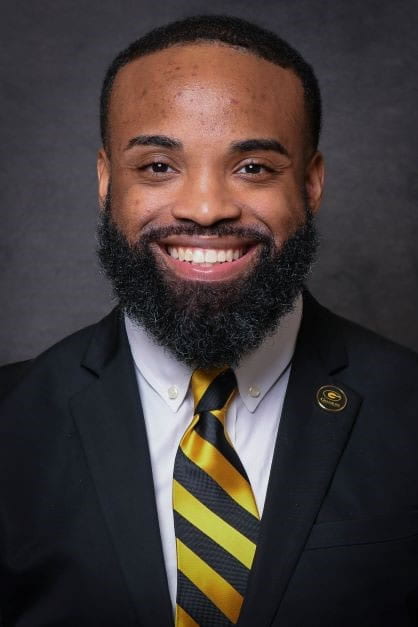Cordara Harper is an acclaimed versatile musician active as a music educator, instructional leader, choral conductor, vocalist, pianist and strategic coach.
A passionate educator, researcher, and conductor, Harper earned his Ph.D. in Music Education with a cognate in Choral Conducting from the Rudi E. Scheidt School of Music in August 2023. His research interests include culturally-sustaining leadership practices, choral conducting, music teacher evaluation, vocal pedagogy, arts entrepreneurship, music psychology, and equity in music education. At the UofM, Harper was an instructor, teaching assistant, research assistant, and choral graduate assistant.
Harper’s conducting experiences include serving as a featured conductor for the University Singers Fall 2021 concert at the University of Memphis and conducting ensembles at West Craven High School in North Carolina. While at the University of Memphis, he performed with the University Singers, Voices of Inspiration, and the Tenor & Bass Choir. He completed the Master of Music degree and post-Masters Certificate in School Administration at the University of North Carolina at Greensboro, Master of Science degree at Amberton University, the Bachelor of Music degree (magna cum laude) at North Carolina Central University, and the Bachelor of Science in Psychology at Fayetteville State University. Harper is a member of Phi Mu Alpha and served as the secretary and treasurer of the Theta Rho Chapter at The University of Memphis.
An active researcher, Harper, is a sought-after leader and has presented at the American Musicological South-East Chapter Fall 2020 meeting, the Society for American Music 2021 Conference, the February 2021 Texas Music Educators Association Clinic, and the February 2021 CMS- Southern Chapter Regional Conference. In addition, he served as an inaugural facilitator and panel guest at The 2021 Sankofa Songs Summer Institute. Harper was featured in the National Association for Music Education’s Teaching Music publication in January 2022.
Harper holds North Carolina, Tennessee, Arkansas, and Mississippi public school licensure in school administration, K-12 music teaching, psychology, and business. Harper is an experienced educator, a K-8 general music teacher at Global Scholars Academy, and a high school choral director at West Craven High School and Cleveland High School in North Carolina.
We asked Harper a few questions as he completed his PhD.
With your degree in hand, what’s your next step?
My next steps include making more time for my family and friends and sharing my time, talents, and abilities with my students, community, and stakeholders. I’m excited to perform with my choirs, conduct more research, and travel.
What does earning your PhD mean to you?
Earning a Ph.D. in music means anything is possible if one dares to dream. This degree has taught me that learning never stops, remembering my why, and persevering. Growing up in the small rural town of Cove City, North Carolina, and becoming the first in my immediate family to earn a bachelor’s, master’s, and now doctorate was challenging. Still, I’m grateful to share these moments with my family, friends, and students. If I understand the history correctly, I have become the first Assistant Professor of Music/Choir Director at Grambling State to hold a doctorate while serving in the role.
How did your time at Memphis contribute to your success?
My time at The University of Memphis was indeed an experience. I’m most grateful for the connections, lifelong friendships I developed, and the flexibility to build a program to meet my needs. I entered the program as an accomplished music teacher and left as an international presenter and assistant professor of music education at Grambling State University.
What is some advice you’d share with others seeking their PhD?
If I could advise anyone seeking a Ph.D., it would be to know your why and find at least one person in your program who can help hold you accountable. Additionally, I’d share to take advantage of opportunities and enjoy the process as best as you can. If this first-generation student can do it, you can do it!
